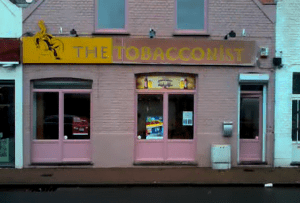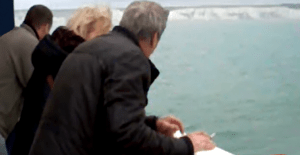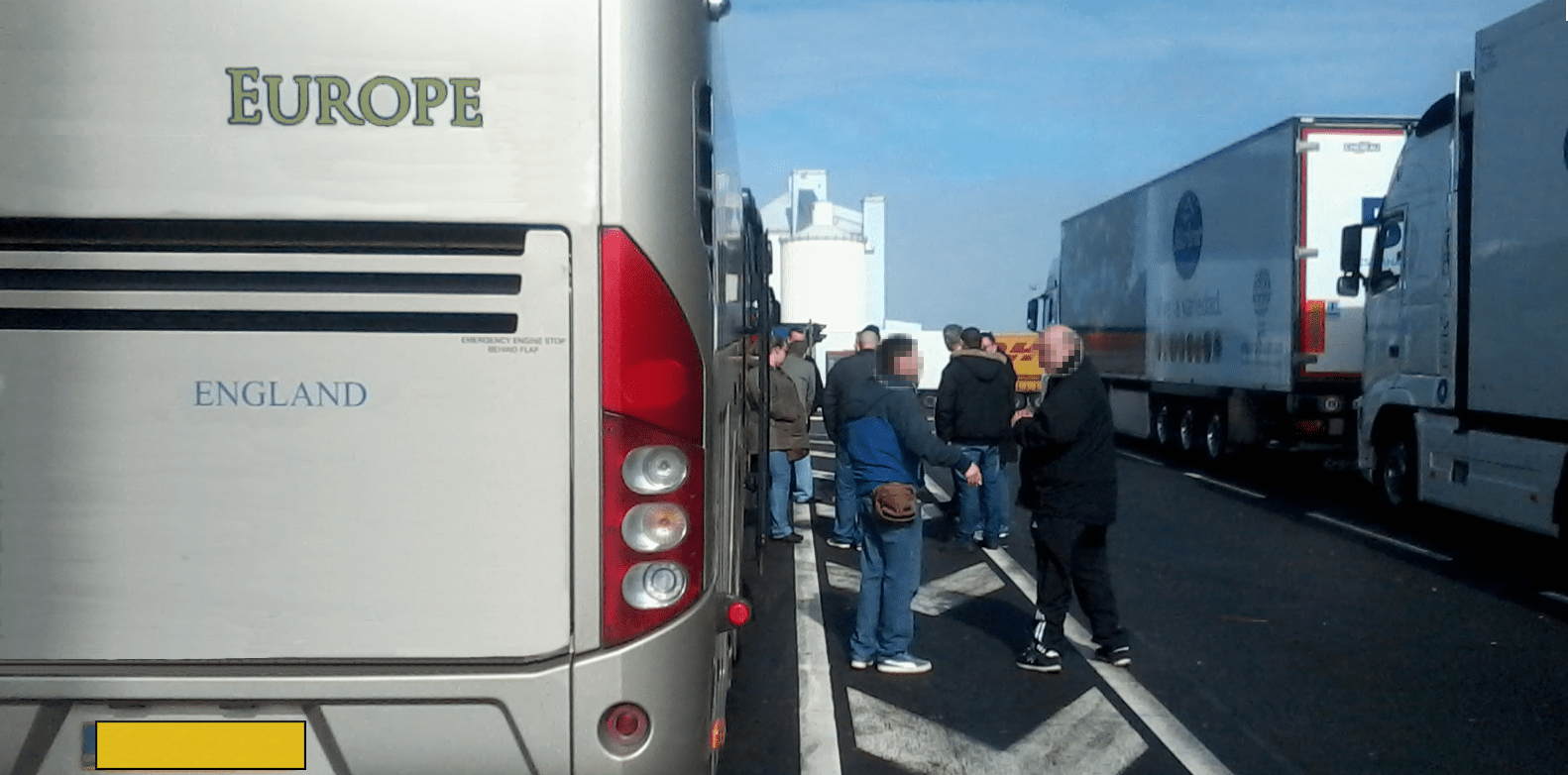For £40 and a sleepless night, you can inject yourself into the pulsing artery of a major drug-running operation worth unknown millions. You stand in a Kentish motorway service station carpark at three am on a Saturday. Just when you’ve given up hope, there’s a rumble, a hiss of brakes, and a coach looms up. Backlit by the coach’s headlights, its occupants descend like locusts to use the lavatories and are back aboard within minutes – and now you are among them. Welcome to the world of the buttleggers – an endangered species since Theresa May announced her vision of a Britain outside the EU Customs Union.
David Morecambe (not his real name) is 70, with rheumy eyes and a nose veined like Stilton. He travels from Dudley, roughly 20 times a year. It’s about seven hours to Dover and he has slept most of the way. He’s ready to board the ferry and glad to explain his motivations. “I save around £3,000 a year this way,” he says. “But if you think about the profit you can make on a sleeve of Amber Leaf, bring back six sleeves of 50gs a week and sell them for £12 each. It’s a lot of money if you sit down and work it out.”
A ‘sleeve’ is a sealed wholesalers’ unit of ten packets of rolling tobacco or ten packs of cigarettes. Amber Leaf is Britain’s most popular rolling tobacco, and one of the cheapest, at around £18 for 50g. But where we are heading, Amber Leaf is just over £8 for 50g. That’s £80 for a sleeve that would cost £180 in Britain. The economics are indisputable. It’s not strictly smuggling, because the goods themselves aren’t prohibited in the UK. It’s more like old-style bootlegging. But it’s bootlegging with fagbutts. Hence: “Buttlegging.”

Credit: Michael Tapp (Creative Commons)
Morecambe is frank: “We all know it goes on. You sell it round pubs and cafes. I can remember when fags cost just pence. There’s too much tax, how come the cost in Europe is so much lower?” Here is a man who makes a substantial saving out of the European Union. But he won’t be sad if Britain leaves the EU: “I think Brexit is a good thing, if it puts an end to these trips then it does. Who knows how it will pan out. Tobacco will still get through.”
He is right about the uncertainty. What was sold to the electorate in June 2016 as a case of cutting Britain free from Europe’s apron-strings has turned out to be more like unpicking a tapestry. One thread is the European Customs Union, established in the 1950s. Any European can buy unlimited amounts of goods at one rate of taxation in another European nation and take them home without paying further duty. A ‘free market’ in tax for the common citizen. The catch (and there’s always a catch) is that the goods must not be resold at home.
Britain entered the Customs Union when it joined the then-EEC in 1973 and the Customs Union was woven into the fabric of the new European Union in 1992. Generally the effect has been to harmonise trade. But disparities exist. Britain has some of the highest tobacco taxes in Europe. Belgium has among the lowest. And there is freedom of movement between the two nations.
The Belgium-to-Britain buttlegging route is a subculture, with its own mythology. Her Majesty’s Revenue and Customs (HMRC) is strict with people it suspects are bringing cheap goods into Britain for illicit resale. At best, a snared buttlegger will lose their cargo. At worst, it can mean a seven year prison sentence. Predictably, much buttlegging mythology centres on how best to avoid such terrible fates. There’s something called the ‘Statement of Truth’, a home-made pre-signed document avowing one’s innocent motivations in hauling tobacco across international borders. The Statement – a recognised form of testimony in civil proceedings — is said to have the same effect upon Customs officers that a crucifix has upon Dracula. First-hand evidence of the efficacy of either is equally elusive. Another tip is to write to the authorities before travelling, alerting them to your good intentions. Imagine the furrowed brow of the officious recipient. Make sure you can roll a decent fag because Customs will make you demonstrate that you smoke. But how serious is the risk of getting caught in the first place?
“Tobacco mule”
Built like a scrum-half, 40-year-old John Robertson (not his real name) has naturally steel-grey hair that is ruffled by the chill pre-dawn wind on the outdoor smoking deck of the Dover-to-Calais P&O ferry He has travelled from Shropshire. A kitchen designer, he is one of millions of Britons whose lives were upended by the 2008 crash. He now describes himself as “a tobacco mule, for want of a better term”.
His business having collapsed, the Jobcentre forced Robertson to spend hours each week scrabbling around online for non-existent jobs. Finally, stress drove him to a decision. Robertson unplugged himself from the benefits system, disappearing from unemployment statistics. He began buttlegging for ‘Kevin’, who is behind a huge and steady flow of illicit tobacco into the north of England.
Sign up as a Kevin ‘mule’ and bring back as much as you can carry (Customs is strict about the ‘what you can carry’ rule). The pay isn’t brilliant – £50 a journey – but Kevin pays the fare and mules also get a few sleeves of Amber Leaf, which they can either smoke or sell.
Robertson has an anxious partner and a child in school. Every second weekend, he makes three trips in a row, on Friday, Saturday and Sunday. This exhausting schedule took some getting used to but his body adjusted naturally to the new rhythm. As he puts it: “Realistically, I’m being paid £50 to sleep on a coach.” Robertson found his beginner’s nerves soon subsided – but then found that the very ease with which he breezed through Customs bothered him. Since he started buttlegging in 2015, he says, HMRC hasn’t once questioned him about his frequent and numerous continental shopping excursions.
He says: “They don’t seem to care about me going back and forth. They must notice when they scan your passport but they never say anything. Britain would be a lot more secure from terrorism if they paid attention. Tobacco-running must be massive in the scheme of things, it’s organised crime.”
Yet no-one is sure of exactly how massive – an unexpected dimension to the buttlegging mythos. Normally one could turn to HMRC for solid facts and figures about tax evasion. It is therefore somewhat sobering to learn that HMRC has little idea about black market tobacco. Figures released in November 2016 are only estimates. And they span a range of possible values. At the low end, the underground tobacco trade is worth an estimated £600m a year. However, at the high end of that range, the value is £1.4bn. The range’s margin of uncertainty is bigger than its minimum value. A finger in the wind.
Robertson isn’t thinking about the Customs Union. “I don’t think we should have left Europe – if it wasn’t broken then don’t fix it, but people are worried about immigration. When we leave, we’ll be more secure. If this trade ends, something else will turn up.”
The Belgium-Britain pipeline

Credit: Author
Adinkerke is just across the border from France, sleepy at the best of times and certainly now, as the coach pulls in, soon after sunrise. An hour’s drive from Calais, the Belgian village is nicknamed ‘Tobacco City’. The coach disgorges its passengers at the village square, which is surrounded by nine tobacco emporiums.
Rosa Leniere, 52, went into business in 2000, naming her store “Discount Tobacco Sales” and festooning the shopfront with Union Jacks. She said: “You can still make a living from it but you won’t get rich any more, like you could then. Prices have gone up in Belgium, because Belgium is greedy, so it isn’t as much of a bargain as it was. Britain can increase tobacco taxes as much as they like – it’s good for our business.”
”Smuggling has gone way way down. Imperial Tobacco can trace which shops are helping smugglers. Two of Adinkerke’s merchants were fined, but I don’t know how much. It can be up to 50,000 Euros. If the UK leaves their Customs officers will be a pain in the arse because they won’t have to let people through any more.” (Leniere’s own shop has since closed down for reasons that remain unknown).
Goods purchased, the 60-strong coach party have time to stretch their legs on the square’s dewy lawn, eat a sandwich, and visit the lavatory before the coach grumbles back into life. This is not a pleasure-trip, and it’s ten hours back to Birmingham. Tobacco worth thousands of pounds is on its way into Britain.
Chris Flory, 55, went into the cross-border shopping business 16 years ago. His midlands-based firm, Innovations, already hired holiday coaches.
He said: “The only practical benefit of Europe for most people was duty-free shopping. We ran an 89-seater to Adinkerke three times a week. The whole industry started copying us but we’ve seen dozens of competitors come and go.

Credit: Author
“Profits are getting very narrow these days. Numbers have fallen because of e-cigarettes. You can see for yourself in your town centre. Even tramps are using them!” ‘Vaping’ has come from nowhere to threaten traditional smoking so seriously that even tumour-barons Philip Morris are talking about embracing a new era of carcinogen-free nicotine addiction.
Flory is positive about Brexit: “There’s no-one campaigned harder than me to get Britain out of Europe. It might mean business takes a hit but we’ll manage. It’s about what is best for your country.”
On the question of buttlegging, Flory is adamant. “At one point Customs were stopping us all the time. They obviously meant to spread the word, so that people would be discouraged by the thought of spending hours stuck at Dover being interviewed like criminals,” he said.
“We take no nonsense. If Customs pulls anyone from our coaches, then we keep a note of who they are and they can’t travel with us again.”
But customers are still signing up and the trips continue. There must still be some serious profitability involved somewhere, surely? His answer is indirect: “You see Customs officers scaring the living daylights out of some of our customers, old guys with a rattly chest and a carrier-bag full of bacca. You know the sort. Do any of them look like smugglers to you?”
Take a video trip to Tobacco City, Belgium





